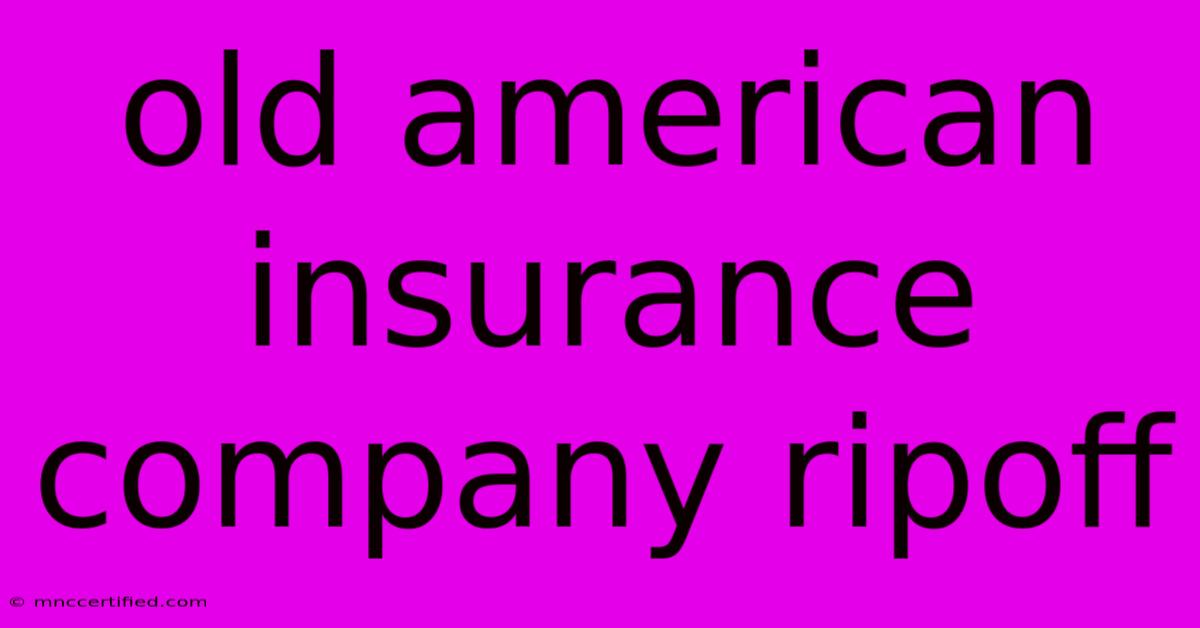Old American Insurance Company Ripoff

Table of Contents
Are Old American Insurance Companies a Ripoff? Separating Fact from Fiction
The insurance industry is vast and complex, with countless companies vying for your business. When it comes to "Old American" insurance companies, the term often refers to companies with a long history in the US, sometimes leading to misconceptions about their practices. This article aims to demystify the "ripoff" label and provide you with the information needed to make informed decisions about your insurance needs.
Understanding the Term "Old American"
"Old American" isn't a specific insurance company. It's a general descriptor for companies with a long-standing presence in the US. These companies can range from giants like MetLife and Prudential to smaller regional providers. While their history may inspire trust, it's crucial to understand that age alone doesn't guarantee fair pricing or exceptional service.
Common Complaints and Concerns
Complaints against insurance companies, including those labeled "Old American," often revolve around:
- High Premiums: Some individuals may feel their premiums are excessively high compared to other providers. This could be due to factors like location, individual risk factors, or the specific type of coverage.
- Claim Denials: Frustration arises when claims are denied, especially when policyholders believe their coverage should cover the situation. This can stem from policy ambiguity, misinterpretation of terms, or even deliberate attempts to avoid payouts.
- Slow or Poor Customer Service: Delays in processing claims, difficulty reaching customer service representatives, and unresolved issues can contribute to a negative perception of a company.
Evaluating "Ripoff" Claims
While some complaints are legitimate, it's essential to separate anecdotal experiences from generalized accusations. Here's how to approach the "ripoff" label:
- Consider the Source: Reviews and complaints found online should be approached with caution. Some may be biased, exaggerated, or even fabricated. Look for diverse perspectives and credible sources.
- Research the Specific Company: Instead of focusing on the "Old American" label, research the specific company you're interested in. Read independent reviews, compare quotes from other providers, and consider the company's financial stability.
- Understand Policy Terms: Before signing any insurance contract, carefully read and understand the policy terms and conditions. This includes exclusions, deductibles, and coverage limits.
Finding the Right Insurance for You
Instead of focusing on "ripoff" accusations, prioritize finding an insurance company that meets your individual needs. Here are some tips:
- Compare Quotes: Obtain quotes from multiple companies to compare prices and coverage options.
- Seek Recommendations: Ask family, friends, and colleagues for their experiences with various insurance providers.
- Read Reviews: Consult online reviews from reputable sources like Consumer Reports, J.D. Power, and A.M. Best.
- Consider Your Needs: Assess your individual risk factors, coverage requirements, and budget to choose the most appropriate plan.
Conclusion
The "Old American" label doesn't automatically equate to a ripoff. Companies with long histories may have built trust, but it's crucial to evaluate them based on their current practices, customer reviews, and policy terms. By being informed and proactive, you can make informed decisions about your insurance needs and find the right provider for your unique situation.

Thank you for visiting our website wich cover about Old American Insurance Company Ripoff. We hope the information provided has been useful to you. Feel free to contact us if you have any questions or need further assistance. See you next time and dont miss to bookmark.
Featured Posts
-
Lafc Advances Past Vancouver In Mls Playoffs
Nov 10, 2024
-
Laser Hair Removal Insurance Coverage
Nov 10, 2024
-
Will Home Insurance Cover Bat Removal
Nov 10, 2024
-
How To Enroll In Ups Health Insurance
Nov 10, 2024
-
Lifeshield National Insurance Reviews
Nov 10, 2024